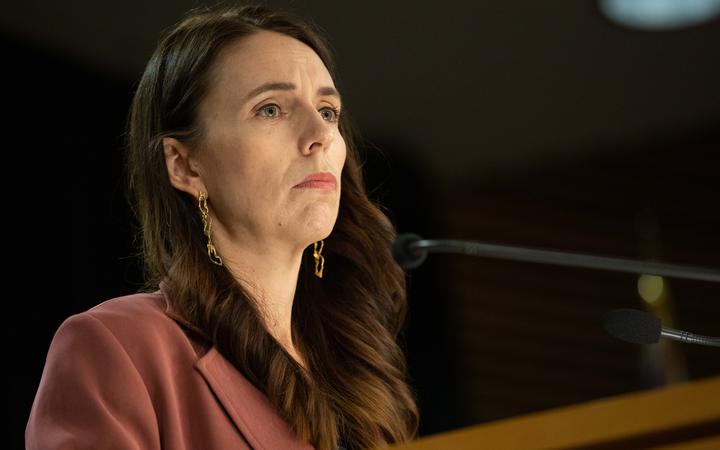Prime Minister Jacinda Ardern says expelling the Russian ambassador remains an option, but it would not have the most impact of the actions New Zealand can take to condemn the Russian invasion.
 PM Jacinda Ardern speaks to media following Russia’s invasion of Ukraine Photo: RNZ / Angus Dreaver
PM Jacinda Ardern speaks to media following Russia’s invasion of Ukraine Photo: RNZ / Angus DreaverMPs are debating whether they can summons the ambassador Georgii Zuev for questioning, after he has twice rebuffed their requests to discuss the war in Ukraine.
Ardern told Morning Report that it is a current discussion by the foreign affairs select committee and it would be “very unusual” for her to interfere in it.
“It’s actually for the foreign affairs select committee to finish their deliberations on this and this is where I’m a little bit cautious because I’m not meant to be commenting on things that are happening within committee and so I want them to let that run its course.”
Ardern said when it is deliberating, the committee is likely to keep in mind the fact that the first time they invited the Russian ambassador the request was rejected and the second time it was ignored.
New Zealand has not expelled the Russian ambassador and Ardern said she believes only one country has done so because there are other measures that have more impact on this conflict.
However, she did not rule out the ambassador being expelled in the future.
She said economic sanctions remain a far more powerful stance.
“When we’ve been engaging with our Ukraine counterparts, the focus for them, very much at the moment on economic sanctions, they can see it as having an impact, they want everyone to continue the pressure.”
Appearing before committee ‘minimum’ ambassador should do – Brownlee
However, National’s foreign affairs spokesperson Gerry Brownlee said appearing before the Foreign Affairs Select Committee is the least Russia’s ambassador can do.
Brownlee said the committee wanted to get the ambassador to appear after the Russian embassy in New Zealand put fake news about what was happening in Ukraine on social media.
“So he’s been asked to come to the committee for that to have a talk about that, that’s the minimum thing that he should do, otherwise what’s the point in having him here?”
Brownlee said there is an ongoing discussion about what happens from this point in terms of his appearing before the committee, but he sees it as a bare minimum.
“What is the point in having the guy in New Zealand if it’s not for us to at least put him on the mat over what we see his government has done, or want to be able to tell him his government is doing, is completely wrong.
“He is Vladimir Putin’s mouthpiece in New Zealand and he is able to sit here, get onto the social media, do all sorts of activities in that social media, pushing that Russian line [that] the rest of the world is making all this up and it’s not nearly as bad as it seems – no one believes that.”
Ardern says outgoing MP Louisa Wall was valued member of Labour caucus
Ardern said outgoing Labour MP Louisa Wall was treated with kindness and respect and was a valued member of the Labour caucus.
Wall told TVNZ’s Q + A programme that she fell out with the Labour Party leadership and was directly told by the prime minister she would never be a minister.
Ardern said cannot comment on how someone feels and does not want to detract from Louisa Wall’s 14 years “that she can stand proud on”.
Ardern said the caucus is strong and united and Wall goes into her new role with the full support of the party.
“The fact that she was in our caucus, she had a strong list position, she now has a role where I think she’ll be using her strengths, I think speaks to the fact that as a caucus and as a Labour Party, we’ve seen her strengths, we’ve acknowledged her strengths.”
Ardern said obviously she takes a differing view from Wall about how she was treated but does not want to analyse that because it would detract from what the outgoing MP had done.
She said the leader of the Labour Party does not select individual candidates for electorates, nor pick every member on the list since they are party processes.
Govt measures unlikely to reform those believing disinformation, Ardern says
Ardern said it is unlikely government action taken to stop the spread of misinformation would be well-received.
In recent weeks there has been growing attention on the abuse and harassment faced by Jacinda Ardern and other women politicians.
Ardern said disinformation has been around for many years, but now it is being accelerated by social media and online platforms.
But she said the types of people who believe misinformation probably would not respond to measures taken by the government.
“Many who fall into a space of consuming disinformation actively on a regular basis, often then come to question the role of government and so a response that is purely driven by government may not have the effect that we want.”
Ardern said people need to be accessing their information from trusted sources.
